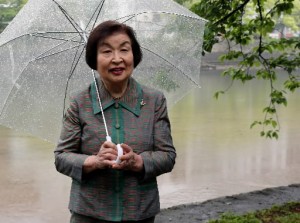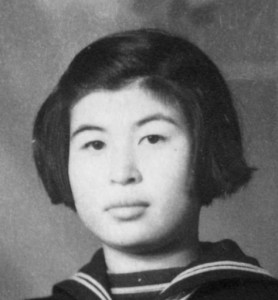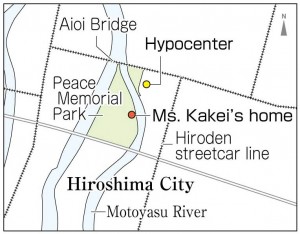Survivors’ Stories: Chiyuki Kakei, 86, Higashihiroshma City
May 23, 2016
Searched for missing parents, day after day
by Rie Nii, Staff Writer
“Please imagine you’re 16 and you’re suddenly alone in the world after losing both of your parents and your home...” said Chiyuki Kakei (née Gotanda), 86, in a gentle, trembling voice, her eyes wet with tears. “I wanted someone who would love me. I needed someone who would take care of me.”
Ms. Kakei was 16 years old, a fourth-year student at Hiroshima Municipal Girls’ High School (now Funairi High School), when the city was attacked with an atomic bomb. She was taking a week-long break before her training was set to begin on August 8, 1945: As a mobilized student, she would serve on the communications staff of the Imperial Japanese Army’s Second General Headquarters. On August 1, she traveled to her great-grandparents’ house, located in the village of Tsuna, Hiroshima Prefecture (now part of Miyoshi City), to get more to eat during that hungry time of war. In order to buy a train ticket for the trip, she left home in Tenjin-machi (now part of Naka Ward), located about 300 meters from the hypocenter, at 5 a.m. with her father, Hisao. Her mother, Ishiko, saw her off at the front door, dressed in a light blue outfit. As they walked to Hiroshima Station, Ms. Kakei talked to her father about many things. She never dreamed this would be the last time she saw her parents.
On the morning of August 6, when Ms. Kakei arrived at Shiwachi Station (now part of Miyoshi City) to make the return trip to Hiroshima, she found that the trains had stopped running. She was told that no trains were coming from Hiroshima because the city had been attacked with a powerful bomb. She stayed at the station overnight and boarded the first train she could the next morning. Back in Hiroshima, she walked from Yaga Station to the Aioi Bridge. At a fire cistern found at one end of the bridge, she saw a woman who had been burned from head to toe. The Motoyasu River, which flowed close to her home, was choked with bodies, their gender unrecognizable, leaving the water itself barely visible. As she walked, she felt the heat from the ground through the soles of her shoes.
She managed to find her ruined home after locating the fire cistern that had been placed in front. But her parents weren’t there. Thinking they had sought refuge elsewhere, she left a message, writing on the side of the cistern with a piece of charred wood: “My parents are missing. I am safe. Chiyuki.” Staying with a schoolmate in the village of Midorii (now part of Asaminami Ward) and her uncle’s home in Hironakashingai (now part of Kure City), she went on foot every day in search of her parents, her sole desire to see them again, until she fell ill as the war ended.
On August 24, she rushed to the rubble of her home after receiving a note from a worker at her father’s company. There, she came across a jawbone with a gold tooth, and realized this was her father’s remains. About one meter away, she found her mother’s remains, too.
Because Ms. Kakei was an only child, she became an orphan. Suffering from back pain and hair loss, she graduated from high school in the spring of 1946. For the next year and a half, she helped on her uncle’s farm in the village of Kanda (now part of Mihara City). She was forced to abandon her dream of going on to study at the Hiroshima Prefectural College for Women.
Ms. Kakei then moved to Mihara, where her cousin lived, and studied at a dressmaking school. She was hired by a dressmaking shop and her encounter with the shop owner, who was Christian, changed her life. She said, “The shop owner was a warm and humane person, and she saved me from emptiness and my hunger for love.”
Meanwhile, at a Buddhist memorial service for her parents, when she wept and told the monk that she wished she had died together with her parents in the bombing, the monk said, “You must keep in mind that you were spared in order to mourn your parents and you must do this with your heart and soul.” Since that time, when feeling discouraged, she has thought of what her parents would say to her, and she has pressed on with her life.
As an A-bomb survivor, she faced difficulty finding a marriage partner, but Seiko Kakei, her father-in-law, finally enabled her to wed when he told her, “We can bring your parents’ memorial tablets to our home and pray for them together.” Katsutoshi Kakei, her husband, was the eldest son of seven siblings. (He died in 1996 at the age of 68.) Ms. Kakei was finally able to become part of a family, and a busy home, and bear a son and a daughter.
Today, Ms. Kakei still attends to customers at the family liquor store. On the evening of August 6 each year, she visits the Peace Memorial Park, the place where her parents lost their lives while at home, to watch the paper lanterns float down the river. “No matter how many years have passed, what happened that day is just like yesterday to me,” she said. Despite the pain of her past, she feels she must embrace her life because she was given the chance to live.
Teenagers’ Impressions
Nuclear weapons damage both bodies and minds
Ms. Kakei told us that she once despised American soldiers because they stole away her parents and her home. However, when she was introduced to Christianity, she was able to overcome these feelings. I realized again how much damage nuclear weapons can do to the bodies and minds of people who have nothing to do with war. I plan to continue telling others about the importance of a peaceful world and the preciousness of life so that people all over the world will work to abolish nuclear weapons. (Kota Ueda, 13)
More thankful for the life now living
When I imagined losing both my parents in the atomic bombing, I wondered if I could act as bravely as Ms. Kakei. If the place where I was living was annihilated in the same way, and I couldn’t find my parents and I saw lots of bodies floating on the river, I think I would panic and I wouldn’t be able to do anything. From now on, I’ll be more thankful for the life I’m now living. (Miyu Okada, 16)
Exchange views with others to promote peace
Ms. Kakei told us that she wants people to have a deep understanding of the horrors of the atomic bombing, not just a superficial idea of what happened, and feel a strong desire to help make the world a more peaceful place. I want to think about peace more than ever, take action, and help create a world where the same tragedy is never repeated. Toward this end, I think language ability is important and it’s vital to effectively exchange views with others. (Kohei Furohashi, 17)
(Originally published on May 23, 2016)
by Rie Nii, Staff Writer
“Please imagine you’re 16 and you’re suddenly alone in the world after losing both of your parents and your home...” said Chiyuki Kakei (née Gotanda), 86, in a gentle, trembling voice, her eyes wet with tears. “I wanted someone who would love me. I needed someone who would take care of me.”
Ms. Kakei was 16 years old, a fourth-year student at Hiroshima Municipal Girls’ High School (now Funairi High School), when the city was attacked with an atomic bomb. She was taking a week-long break before her training was set to begin on August 8, 1945: As a mobilized student, she would serve on the communications staff of the Imperial Japanese Army’s Second General Headquarters. On August 1, she traveled to her great-grandparents’ house, located in the village of Tsuna, Hiroshima Prefecture (now part of Miyoshi City), to get more to eat during that hungry time of war. In order to buy a train ticket for the trip, she left home in Tenjin-machi (now part of Naka Ward), located about 300 meters from the hypocenter, at 5 a.m. with her father, Hisao. Her mother, Ishiko, saw her off at the front door, dressed in a light blue outfit. As they walked to Hiroshima Station, Ms. Kakei talked to her father about many things. She never dreamed this would be the last time she saw her parents.
On the morning of August 6, when Ms. Kakei arrived at Shiwachi Station (now part of Miyoshi City) to make the return trip to Hiroshima, she found that the trains had stopped running. She was told that no trains were coming from Hiroshima because the city had been attacked with a powerful bomb. She stayed at the station overnight and boarded the first train she could the next morning. Back in Hiroshima, she walked from Yaga Station to the Aioi Bridge. At a fire cistern found at one end of the bridge, she saw a woman who had been burned from head to toe. The Motoyasu River, which flowed close to her home, was choked with bodies, their gender unrecognizable, leaving the water itself barely visible. As she walked, she felt the heat from the ground through the soles of her shoes.
She managed to find her ruined home after locating the fire cistern that had been placed in front. But her parents weren’t there. Thinking they had sought refuge elsewhere, she left a message, writing on the side of the cistern with a piece of charred wood: “My parents are missing. I am safe. Chiyuki.” Staying with a schoolmate in the village of Midorii (now part of Asaminami Ward) and her uncle’s home in Hironakashingai (now part of Kure City), she went on foot every day in search of her parents, her sole desire to see them again, until she fell ill as the war ended.
On August 24, she rushed to the rubble of her home after receiving a note from a worker at her father’s company. There, she came across a jawbone with a gold tooth, and realized this was her father’s remains. About one meter away, she found her mother’s remains, too.
Because Ms. Kakei was an only child, she became an orphan. Suffering from back pain and hair loss, she graduated from high school in the spring of 1946. For the next year and a half, she helped on her uncle’s farm in the village of Kanda (now part of Mihara City). She was forced to abandon her dream of going on to study at the Hiroshima Prefectural College for Women.
Ms. Kakei then moved to Mihara, where her cousin lived, and studied at a dressmaking school. She was hired by a dressmaking shop and her encounter with the shop owner, who was Christian, changed her life. She said, “The shop owner was a warm and humane person, and she saved me from emptiness and my hunger for love.”
Meanwhile, at a Buddhist memorial service for her parents, when she wept and told the monk that she wished she had died together with her parents in the bombing, the monk said, “You must keep in mind that you were spared in order to mourn your parents and you must do this with your heart and soul.” Since that time, when feeling discouraged, she has thought of what her parents would say to her, and she has pressed on with her life.
As an A-bomb survivor, she faced difficulty finding a marriage partner, but Seiko Kakei, her father-in-law, finally enabled her to wed when he told her, “We can bring your parents’ memorial tablets to our home and pray for them together.” Katsutoshi Kakei, her husband, was the eldest son of seven siblings. (He died in 1996 at the age of 68.) Ms. Kakei was finally able to become part of a family, and a busy home, and bear a son and a daughter.
Today, Ms. Kakei still attends to customers at the family liquor store. On the evening of August 6 each year, she visits the Peace Memorial Park, the place where her parents lost their lives while at home, to watch the paper lanterns float down the river. “No matter how many years have passed, what happened that day is just like yesterday to me,” she said. Despite the pain of her past, she feels she must embrace her life because she was given the chance to live.
Teenagers’ Impressions
Nuclear weapons damage both bodies and minds
Ms. Kakei told us that she once despised American soldiers because they stole away her parents and her home. However, when she was introduced to Christianity, she was able to overcome these feelings. I realized again how much damage nuclear weapons can do to the bodies and minds of people who have nothing to do with war. I plan to continue telling others about the importance of a peaceful world and the preciousness of life so that people all over the world will work to abolish nuclear weapons. (Kota Ueda, 13)
More thankful for the life now living
When I imagined losing both my parents in the atomic bombing, I wondered if I could act as bravely as Ms. Kakei. If the place where I was living was annihilated in the same way, and I couldn’t find my parents and I saw lots of bodies floating on the river, I think I would panic and I wouldn’t be able to do anything. From now on, I’ll be more thankful for the life I’m now living. (Miyu Okada, 16)
Exchange views with others to promote peace
Ms. Kakei told us that she wants people to have a deep understanding of the horrors of the atomic bombing, not just a superficial idea of what happened, and feel a strong desire to help make the world a more peaceful place. I want to think about peace more than ever, take action, and help create a world where the same tragedy is never repeated. Toward this end, I think language ability is important and it’s vital to effectively exchange views with others. (Kohei Furohashi, 17)
(Originally published on May 23, 2016)










